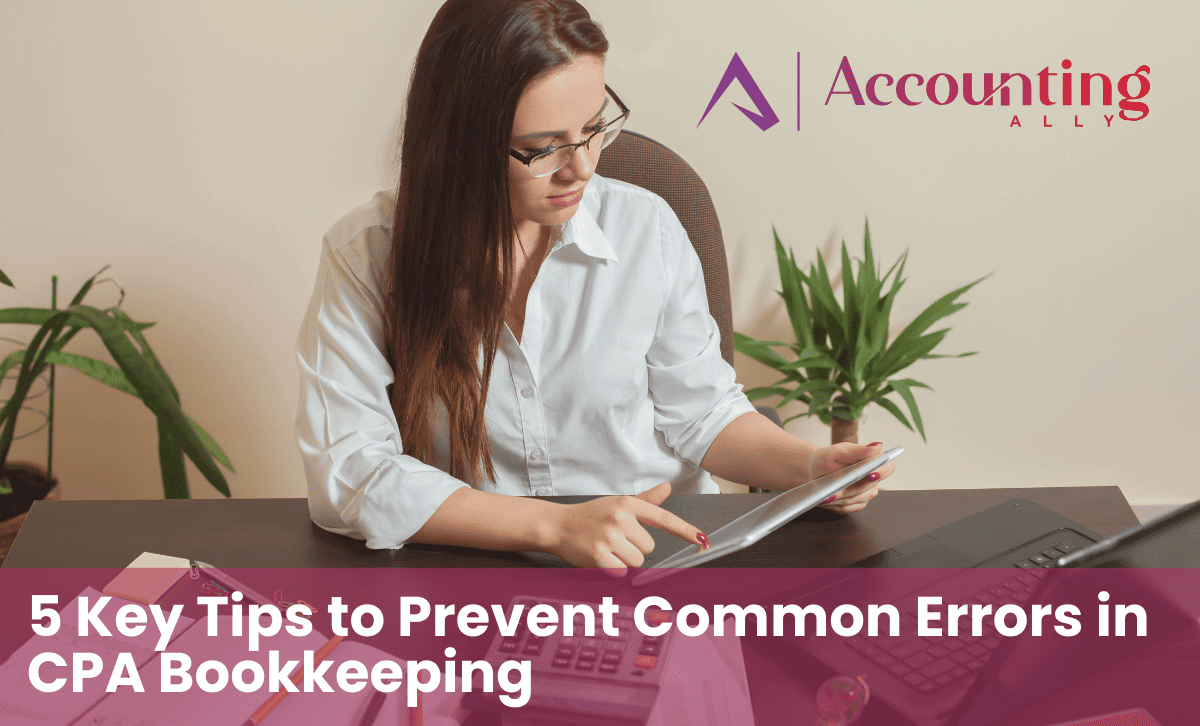5 Key Tips to Prevent Common Errors in CPA Bookkeeping
The Importance of Accuracy in CPA Bookkeeping
In the realm of CPA bookkeeping, precision is imperative. Every transaction, regardless of its size, must be meticulously recorded and accurately classified to ensure that financial statements comply with regulations and truly reflect a firm’s financial health.
This meticulous approach prevents costly errors that could adversely affect financial analyses and tax outcomes, thereby safeguarding a firm’s reputation and its capacity to serve clients effectively.
CPA firms manage a multitude of financial details daily, ranging from intricate client accounts to routine internal audits. In such a high-stakes environment, even seemingly minor bookkeeping errors can escalate into significant issues.
These mistakes can distort a firm’s understanding of its financial health, lead to compliance problems, and ultimately erode client trust—a consequence no firm can afford.
This comprehensive guide addresses these challenges directly, outlining best practices and efficient strategies to strengthen your bookkeeping accounting services. By emphasizing regular reconciliations, diligent tracking of every transaction, and precise expense classification, CPA firms can avoid common pitfalls that often beset less meticulous practitioners.
Furthermore, staying abreast of technological advancements in bookkeeping services can revolutionize a CPA firm’s operations. Adopting modern, automated solutions not only reduces the risk of human error but also enhances overall efficiency, allowing CPAs to concentrate more on strategic financial management and less on routine data entry.
Strategies to Prevent Common CPA Bookkeeping Errors
1. Establish Comprehensive Reconciliation Protocols
- Action Plan: Conduct frequent and thorough reconciliations of all accounts to detect and rectify discrepancies promptly.
- Implementation: Set a consistent schedule—preferably monthly, if not weekly—to align transaction records with bank statements and other financial documents. This practice aids in identifying errors resulting from duplicate entries, transposed numbers, or overlooked postings, which are prevalent in fast-paced settings.
2. Ensure Detailed Recording of Minor Transactions
- Action Plan: Document every financial movement, regardless of its magnitude, to prevent the accumulation of unnoticed discrepancies over time.
- Implementation: Leverage digital tools to automatically track these transactions, minimizing human error and providing a transparent audit trail.
3. Implement Uniform Expense Categorization
- Action Plan: Develop a standardized system for categorizing expenses that aligns with current tax laws and accounting standards.
- Implementation: Conduct regular training sessions for all bookkeeping personnel to reinforce these standards and reduce classification errors, which are among the most common mistakes in accounting.
4. Adopt Advanced Accounting Technologies
- Action Plan: Utilize modern online bookkeeping services that offer tools to reduce manual data entry, automate workflows, and improve accuracy.
- Implementation: Consider software solutions like QuickBooks, Xero, or Sage, which provide robust platforms capable of managing complex accounting tasks with greater precision.
5. Mitigate the Impact of Talent Shortages in CPA Bookkeeping
- Action Plan: Implement strategies to address the shortage of qualified professionals, which can lead to overworked staff and increased errors.
- Implementation:
- Invest in Training and Development: Enhance the skills of your current team through cross-training to handle multiple aspects of bookkeeping and accounting.
- Utilize Outsourcing: Consider offshore bookkeeping services to allow your core team to focus on more complex and strategic financial management activities.
- Adopt Automation Tools: Automate routine processes to reduce dependency on human input, thereby decreasing the potential for errors and enabling your staff to manage more with less.
Leveraging Outsourcing as a Strategic Advantage in CPA Bookkeeping
Outsource bookkeeping has emerged not only as a solution for addressing common bookkeeping mistakes but also as a pivotal growth strategy for CPA firms. In today’s competitive landscape, the ability to streamline operations, reduce errors, and optimize resources is crucial.
Outsourcing bookkeeping services can significantly alleviate the burden on in-house staff, allowing firms to focus on higher-value activities such as client engagement and strategic financial planning.
However, the effectiveness of outsourced accounting depends largely on the choice of the outsourcing partner. Selecting the right service provider is critical, as it affects not only the quality of bookkeeping but also the integrity and reliability of your financial reporting.
A dependable partner ensures compliance, enhances accuracy, and maintains the confidentiality of sensitive information—cornerstones of trust in the CPA-client relationship.
Key Statistics on CPA Bookkeeping & Outsourcing
- 40% of small businesses consider bookkeeping and tax preparation their biggest challenge.
- 82% of businesses fail due to cash flow mismanagement, highlighting the importance of proper bookkeeping.
- Companies that outsource bookkeeping reduce operational costs by 30-50%.
Conclusion
Maintaining accuracy in CPA and bookkeeping services is critical to the financial health of a firm. By implementing best practices, leveraging automation, and utilizing virtual bookkeeping services, firms can minimize errors and enhance efficiency. Furthermore, offshore bookkeeping services provide a strategic advantage, allowing firms to optimize resources and focus on client-centric services. Choosing the right outsourcing partner can transform bookkeeping from a routine task into a competitive advantage, ensuring growth and success in an increasingly demanding market.
FAQs
1. What are the benefits of outsourcing bookkeeping for CPA firms?
Outsourcing bookkeeping helps CPA firms reduce operational costs, improve efficiency, and allow internal teams to focus on higher-value financial activities.
2. How do I choose the right outsourcing partner for bookkeeping?
Look for outsourcing providers with a strong track record, advanced technological solutions, strict compliance policies, and transparent reporting mechanisms.
3. What bookkeeping software is best for CPA firms?
Popular bookkeeping software includes QuickBooks, Xero, and Sage, offering automation and real-time reporting for improved accuracy and efficiency.
4. How can automation help reduce bookkeeping errors?
Automation eliminates manual data entry, categorizes transactions accurately, and provides real-time reconciliation, reducing human error and improving financial accuracy.
5. Is offshore bookkeeping secure?
Yes, with the right security measures such as data encryption, multi-factor authentication, and regulatory compliance, offshore bookkeeping services can be highly secure and efficient.


